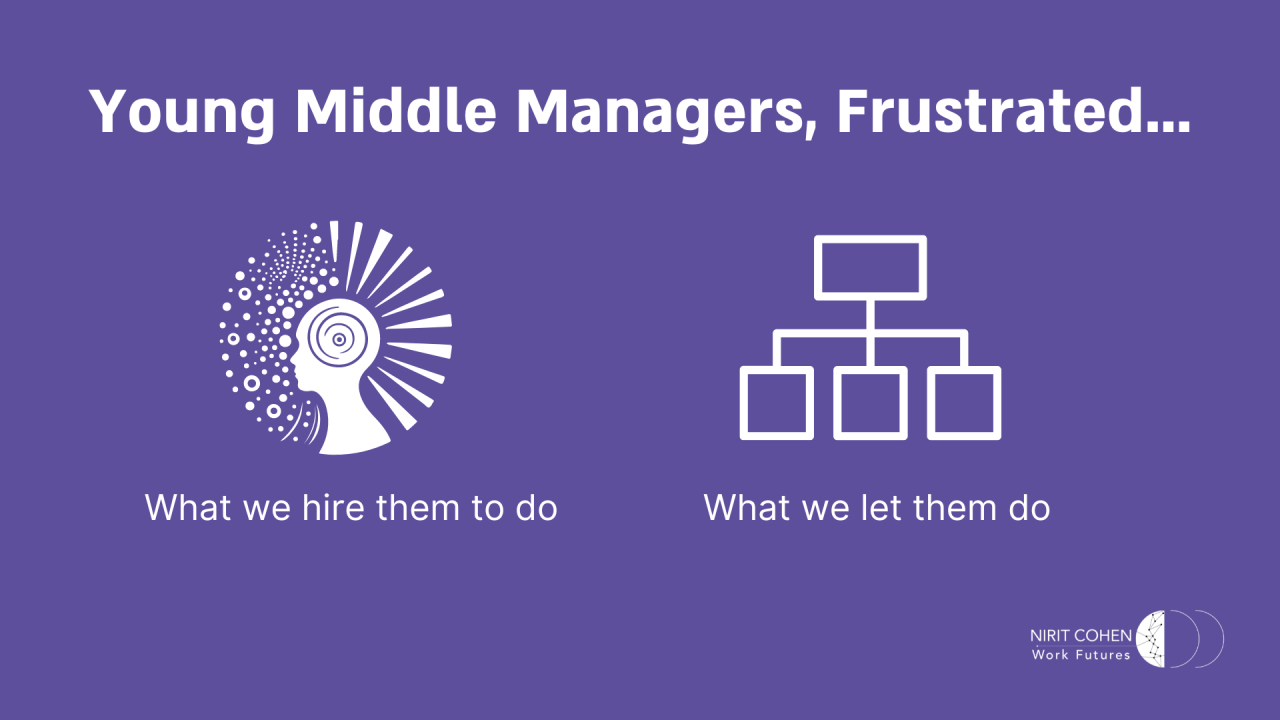The Value Of Middle Managers: Bridging The Gap Between Leadership And Employees

Table of Contents
Middle Managers as Communication Hubs
Middle managers act as vital communication hubs, facilitating the smooth flow of information between upper management and frontline employees. This bidirectional communication is crucial for a healthy and productive work environment. Without effective middle management, information can become distorted, delayed, or lost entirely.
Translating Strategic Goals
Middle managers are responsible for translating complex strategic goals into actionable tasks for their teams. This involves breaking down large-scale objectives into smaller, manageable steps that individual team members can understand and work towards.
- Example: A company-wide sales target of $1 million can be broken down into individual team goals, perhaps assigning $200,000 targets to each of five teams.
- Example: Complex corporate policies regarding data privacy can be explained in a clear and understandable way to ensure team members comply with regulations.
Collecting and Relaying Employee Feedback
Middle managers also play a crucial role in gathering feedback from employees and effectively communicating it to senior leadership. This upward communication is essential for identifying and addressing employee concerns before they escalate into larger problems.
- Importance of upward communication: This ensures that senior leaders have a realistic understanding of the challenges and perspectives of their workforce.
- Identifying and addressing employee concerns: Promptly addressing issues boosts morale and prevents potential conflicts or productivity losses.
Middle Managers as Mentors and Coaches
Beyond communication, middle managers serve as vital mentors and coaches for their team members, fostering professional growth and development. This mentorship is key to retaining talent and building a high-performing team.
Providing Training and Support
Middle managers are responsible for providing ongoing training and support to their teams. This ensures employees have the skills and knowledge needed to excel in their roles.
- Improving employee skills and knowledge: Regular training sessions, workshops, or mentoring programs enhance proficiency and efficiency.
- Boosting employee confidence and performance: Support and encouragement lead to increased confidence and better performance.
Promoting Employee Growth and Development
Effective middle managers create a culture of learning and development. They identify talent within their teams and actively advocate for promotion opportunities.
- Example: Identifying high-potential employees and recommending them for leadership development programs.
- Example: Mentoring employees to take on new challenges and responsibilities, thereby expanding their skill sets and experience.
Middle Managers as Performance Drivers
Middle managers are directly responsible for driving performance and productivity within their teams. Their leadership style and management techniques significantly impact team output.
Setting Clear Expectations and Goals
Setting clear, measurable, achievable, relevant, and time-bound (SMART) goals is crucial for team success. These goals must align with the overall organizational objectives.
- Ensuring alignment with overall organizational objectives: This ensures that team efforts contribute directly to the company's success.
- Regularly monitoring progress and providing feedback: Consistent monitoring and feedback keep teams on track and address any potential roadblocks.
Managing Resources Effectively
Middle managers are responsible for efficiently allocating resources within their teams, optimizing workflows, and ensuring the team has the necessary tools and support to succeed.
- Optimizing workflows and processes: Streamlining processes improves efficiency and reduces wasted time and resources.
- Ensuring the team has the necessary tools and support: Providing the right equipment, software, and training empowers team members to perform their best.
Investing in Middle Management for Organizational Success
Investing in effective middle management training and development is a long-term investment that yields significant returns. This investment directly impacts employee satisfaction, retention, and ultimately, the overall success of the organization.
Improved Employee Retention
Effective middle management leads to higher employee satisfaction and retention rates, reducing the costs associated with recruitment and training new employees.
- Reduced recruitment costs: Lower turnover means less money spent on hiring and onboarding.
- Maintained institutional knowledge: Experienced employees retain valuable knowledge and expertise within the organization.
Enhanced Organizational Agility and Adaptability
Strong middle management enables organizations to respond more quickly to change and market demands. They facilitate quicker decision-making and drive innovation.
- Facilitating quicker decision-making: Empowered middle managers can make timely decisions without needing constant approval from senior management.
- Driving innovation and improvement: Middle managers are often closest to the day-to-day operations and can identify areas for improvement and innovation.
Conclusion: The Undervalued Asset: Recognizing the Value of Middle Managers
In summary, middle managers play a multifaceted role, acting as communication hubs, mentors, performance drivers, and crucial links between leadership and employees. Their contributions are vital for bridging the gap between strategic goals and on-the-ground execution. Effective middle management significantly impacts organizational performance, employee satisfaction, and overall success. Invest in your middle managers today and unlock the full potential of your organization. Understanding the true value of middle managers is key to building a high-performing and engaged workforce.

Featured Posts
-
 Mange Skisentre Stenger Tidligere Enn Vanlig Pa Grunn Av Mild Vinter
May 09, 2025
Mange Skisentre Stenger Tidligere Enn Vanlig Pa Grunn Av Mild Vinter
May 09, 2025 -
 Elizabeth City Police Search For Vehicle Break In Suspect
May 09, 2025
Elizabeth City Police Search For Vehicle Break In Suspect
May 09, 2025 -
 When To Watch The Next High Potential Episode On Abc
May 09, 2025
When To Watch The Next High Potential Episode On Abc
May 09, 2025 -
 The Impact Of Daycare On Children Evidence Based Insights
May 09, 2025
The Impact Of Daycare On Children Evidence Based Insights
May 09, 2025 -
 Public Reaction To Pam Bondis Statements On Killing American Citizens
May 09, 2025
Public Reaction To Pam Bondis Statements On Killing American Citizens
May 09, 2025
Latest Posts
-
 Jesse Watters Faces Backlash Hypocrisy Claims After Wife Cheating Joke
May 09, 2025
Jesse Watters Faces Backlash Hypocrisy Claims After Wife Cheating Joke
May 09, 2025 -
 The Aoc Fox News Trump Controversy A Breakdown
May 09, 2025
The Aoc Fox News Trump Controversy A Breakdown
May 09, 2025 -
 Jessica Tarlov Critiques Jeanine Pirros Pro Trade War Stance On Canada
May 09, 2025
Jessica Tarlov Critiques Jeanine Pirros Pro Trade War Stance On Canada
May 09, 2025 -
 Fox News Host Faces Aocs Criticism Over Trump Support
May 09, 2025
Fox News Host Faces Aocs Criticism Over Trump Support
May 09, 2025 -
 Fox News Judge Jeanine Pirro Intimate Reflections On Life Fears And Love
May 09, 2025
Fox News Judge Jeanine Pirro Intimate Reflections On Life Fears And Love
May 09, 2025
